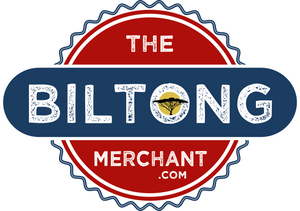A Brief History of Biltong
The word “biltong” comes from an Afrikaans amalgamation of two Dutch words:
“Bil” translates as rump, buttock or hindquarter, while “tong” means strip, or tongue.
So - the dictionary definition of biltong is: “lean meat which is salted and dried in strips”.
However, biltong is much more than just strips of meat. Its story is woven into the history of humankind and illustrates our innate ability for survival under the toughest conditions.
Dating back more than 20,000 years, the earliest southern Africans were hunter-gatherers. There were several different groups of indigenous peoples, who preserved their meat by cutting it into strips and hanging it up to dry. The arid African heat was ideal for this and dried meat was the perfect sustenance during their nomadic travels, following the herds of game and searching for water sources. The inhabitants of southern Africa passed this skill down through generations and air-dried meat has remained a staple food on the continent ever since.
During the 15th century, the southern Cape of Africa was discovered by the Portuguese; the first Europeans to explore the area. In 1488, Bartholomeu Dias discovered the site during his exploration of the African west coast, while a decade later, Vasco da Gama recorded it during his mission to find the elusive trade route to Asia.
Within a hundred years, the settlement that became known as Capetown developed into a major trading post along the lucrative spice trade routes between Europe and India and southern Asia. It also became the centre point for colonialist battles over the bountiful African landscape, as well as the starting point for the movement of European settlers inland across the continent.
...Now - there is so much to learn about the history of the region and its huge variety of inhabitants and immigrants, but here’s not where it happens. Here’s where we learn about biltong, right? But, just so you know, we will be exploring the history of SA in the future - it’s important to learn about - and from - our collective human experience...
So - back to biltong.
The settlers who moved north into southern Africa were mainly Dutch, German and French - all looking for land to farm and homes to make. They learned the skills of the indigenous peoples in order to preserve their own meat supplies in the hot, dry climate. Plus they had salt (saltpetre) to help with the preservation. They added their own ingredients too: vinegar, pepper and coriander became the traditional biltong ingredients of the Voortrekkers - the wagon-travellers - as they crossed the continent.
Fresh meat sources were plentiful, with kudu antelope, wildebeest, ostrich and zebra providing a variety of flavours for the biltong stores. Once the settlers had established their farms and increased their cattle herds, beef became the main source of meat for biltong and remains so to this day. With the invention of refrigeration, keeping food fresh for longer became a whole lot easier. However, the biltong recipes and air-drying methods for making biltong products were passed down from generation to generation and biltong has kept its crown as the ultimate South African meat snack delicacy!
Biltong is still widely loved in South Africa and has gained growing popularity around the world, both through travellers visiting the country and discovering the tasty snack, and by the emigration of South Africans to other countries. Only the best cuts of meat are used for good biltong, from grass-fed, well bred animals. That, combined with the fact that the meat is air-dried, not cooked, makes it a wholesome and healthy alternative to other meat snacks, such as jerky.
Many South Africans - and SA expats around the world - make their own biltong at home and there are special meat-drying units that one can buy to do this, if the traditional 2 week air-dry option is tricky. This is particularly relevant in the northern hemisphere, where climates are colder and more humid. There are also excellent commercial biltong producers in the UK, many of whom we hope to share our marketplace with here at The Biltong Merchant. We hope to be the ideal place to buy biltong online, learn about the UK's fantastic biltong producers and maybe learn a biltong recipe or two for inspiration - it’s a hugely exciting work in progress...
So, from its roots as a vital source of food in the harshest conditions, to its modern role as the perfect snack at a rugby match or on a forest hike, biltong has played a big part in the human story. And with its growing popularity as a low carb, high protein alternative to the vast calorific snack mountains available today, it can only be a good addition to a healthy balanced diet!



